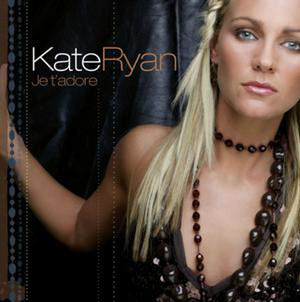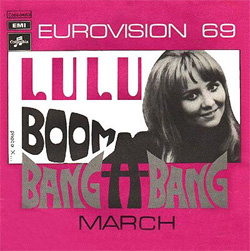
The Eurovision Song Contest 2003 was the 48th edition of the Eurovision Song Contest. It took place in Riga, Latvia, following the country's victory at the 2002 contest with the song "I Wanna" by Marie N. Organised by the European Broadcasting Union (EBU) and host broadcaster Latvijas Televīzija (LTV), the contest was held at the Skonto Hall on 24 May 2003. The contest was presented by last year's winner Marie N and former contestant Renārs Kaupers.

Urban Trad is a Belgian folk music group, consisting of both Flemish and French speaking people and a close connection with Galicia.
Jemini are a British pop group from Liverpool, best known for scoring nul points and finishing in last place at the Eurovision Song Contest 2003 with "Cry Baby".
The United Kingdom participated in the Eurovision Song Contest 2003 with the song "Cry Baby" written by Martin Isherwood. The song was performed by the duo Jemini. The British entry for the 2003 contest in Riga, Latvia was selected via the national final A Song for Europe 2003, organised by the British broadcaster BBC. Eight acts competed in the national final which consisted of a semi-final and a final, during which the winner was selected entirely through a regional televote.
The United Kingdom participated in the Eurovision Song Contest 1986 with its entry "Runner in the Night" performed by the group Ryder. The song was chosen through the A Song for Europe national final which consisted of eight songs in 1986. At the Eurovision Song Contest 1986 held in Bergen, Norway, Ryder and the song placed seventh with 72 points.
Samantha Janus represented United Kingdom in the Eurovision Song Contest 1991 with the Paul Curtis-written song "A Message to Your Heart", which was placed 10th.

Belgium has participated in the Eurovision Song Contest 64 times since making its debut as one of seven countries at the first contest in 1956. The only countries with the same number or more appearances are Germany (66), France (65) and the United Kingdom (65). Belgium have been absent only three times in total, in 1994, 1997 and 2001, due to low scores in the previous contests that relegated them from the contest. Belgium has won the contest once, in 1986.

Gigliola Cinquetti is an Italian singer, songwriter, and television presenter.

"Je t'adore" is a song by Belgian singer Kate Ryan. It was the Belgian entry in the Eurovision Song Contest 2006, performed in English. It was the seventh song to be performed in this contest and the 999th by counting all songs which had ever performed on Eurovision Song Contest. "Je t'adore" was released in 2006 as the lead single from Ryan's third studio album Alive (2006).

"Boom Bang-a-Bang" is a song recorded by Scottish singer Lulu. The song was written by Alan Moorhouse and Peter Warne. It was the British winning entry at the Eurovision Song Contest 1969, held in Madrid. It was the joint winner with three other entries: Salomé singing "Vivo cantando" for Spain, Lenny Kuhr singing "De troubadour" for the Netherlands, and Frida Boccara singing "Un jour, un enfant" for France.

"J'aime la vie" was the winning song of the Eurovision Song Contest 1986, performed for Belgium by Sandra Kim. Belgium had finished the 1985 contest in last place, and thus achieved the rare turnaround from last to first in the space of one year. The song also marks the only time to date that Belgium has won the contest. The song was also included on Kim's album J'aime la vie in 1986. When released as a single, it topped Belgium's singles chart for seven weeks and was the country's best-selling hit of 1986, and it also reached the top 20 in Austria, the Netherlands, Portugal, and Sweden.

"Non ho l'età ", usually given as just "Non ho l'età", was the winning song in the Eurovision Song Contest 1964, held in Copenhagen. It was performed in Italian by Gigliola Cinquetti representing Italy. Like all previous Italian Eurovision entries, the song had also won that year's Sanremo Music Festival. Cinquetti was sixteen years old, making her the youngest Eurovision winner in history until 1986 when Belgium's Sandra Kim won the contest with "J'aime la vie" – initially claiming to be fifteen, it was later revealed that Kim was only thirteen. In 1990, the EBU made a new rule requiring contestants to be aged 16 or older before the contest; this age rule still operates.
Belgium participated in the Eurovision Song Contest 2003 with the song "Sanomi" written by Yves Barbieux. The song was performed by the group Urban Trad, which was internally selected by the Walloon broadcaster Radio Télévision Belge de la Communauté Française (RTBF) in December 2002 to represent the nation at the 2003 contest in Riga, Latvia. The song, "Sanomi", was presented to the public on 31 March 2003.
Russia participated in the Eurovision Song Contest 2003 in Riga, Latvia. The Russian entry was selected internally by the Russian broadcaster Channel One Russia (C1R). t.A.T.u. represented Russia with the song "Ne ver', ne boysia", which placed 3rd and scored 164 points at the contest.

Ishtar is a Belgian (Flemish) folk band who represented Belgium at the 2008 Eurovision Song Contest with the song "O Julissi", sung in an imaginary language. They competed in the first semi-final on 20 May 2008.

"Rock Bottom" was the British entry in the Eurovision Song Contest 1977, performed in English by Lynsey de Paul and Mike Moran. It was also written and produced by de Paul and Moran and released on the Polydor record label. Originally it was written for the group Blue Mink; and submitted unbeknown to de Paul and Moran as an entry for A Song For Europe by the publishers; when it was selected, de Paul agreed to perform the song if Moran would join her. On 9 March 1977, "Rock Bottom" was selected to represent the UK at the A Song for Europe 1977 event held at the New London Theatre, presented by Terry Wogan.
Belgium was represented by Jean Vallée, with the song "L'amour ça fait chanter la vie", at the 1978 Eurovision Song Contest, which took place on 22 April in Paris.
The Eurovision Song Contest Previews are annually broadcast TV shows showcasing the entries into the forthcoming Eurovision Song Contest. They were inaugurated in 1971 for the contest in Dublin, Ireland, and have been provided by the European Broadcasting Union (EBU) to all participating countries ever since.

"Everyway That I Can" is the winning song of the Eurovision Song Contest 2003 sung in English by Sertab Erener for Turkey. The song was written by Demir Demirkan in early 2003 and produced and arranged by Ozan Çolakoğlu, famous for his works with pop idol Tarkan. Initially, it sparked controversy in Turkey for its subject matter and English-language lyrics, and was not considered a favorite to win the contest.











